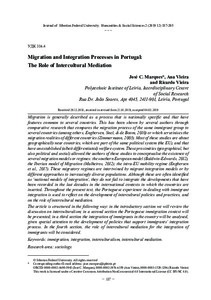Показать сокращенную информацию
Migration and Integration Processes in Portugal: The Role of Intercultural Mediation
| Автор | Marques, José C. | en |
| Автор | Vieira, Ana | en |
| Автор | Vieira, Ricardo | en |
| Автор | Маркес, Ж.К. | ru_RU |
| Автор | Виейра, А. | ru_RU |
| Автор | Виейра, Р. | ru_RU |
| Дата внесения | 2019-02-27T11:00:22Z | |
| Дата, когда ресурс стал доступен | 2019-02-27T11:00:22Z | |
| Дата публикации | 2019-02 | |
| URI (для ссылок/цитирований) | https://elib.sfu-kras.ru/handle/2311/109549 | |
| Аннотация | Migration is generally described as a process that is nationally specific and that have features common to several countries. This has been shown by several authors through comparative research that compares the migration process of the same immigrant group to several countries (among others, Engbersen, Snel, & de Boom, 2010) or which scrutinises the migration realities of different countries (Zimmermann, 2005). Most of these studies are about geographically near countries, which are part of the same political system (the EU), and that have an established (albeit differentiated) welfare system. These proximities (geographical, but also political and social) allowed the authors of these studies to conceptualise the existence of several migration models or regimes: the southern European model (Baldwin-Edwards, 2012), the Iberian model of Migration (Malheiros, 2012); the intra-EU mobility regime (Engbersen et al., 2017). These migratory regimes are intertwined by migrant integration models or by different approaches to increasingly diverse populations. Although these are often identified as ‘national models of integration’, they do not fail to integrate the developments that have been recorded in the last decades in the international contexts in which the countries are inserted. Throughout the present text, the Portuguese experience in dealing with immigrant integration is used to reflect on the development of intercultural policies and practices, and on the role of intercultural mediation. The article is structured in the following way: in the introductory section we will review the discussion on interculturalism; in a second section the Portuguese immigration context will be presented; in a third section the integration of immigrants in the country will be analysed, given special attention to the development of policies that support immigrants’ integration process. In the fourth section, the role of intercultural mediation for the integration of immigrants will be considered | en |
| Аннотация | Как правило, миграцию описывают как процесс, имеющий некий пул общих и уникальных для различных стран особенностей. Некоторые авторы (Engbersen, Snel & de Boom, 2010 и другие) сравнивают миграционные процессы одной и той же группы иммигрантов в ряде стран или анализируют миграционные реалии разных государств (Zimmermann, 2005). Большинство таких исследований посвящено странам, которые близко расположены географически, выступают частью одной политической системы (ЕС) и имеют установленную (хотя и дифференцированную) систему социального обеспечения. Подобная близость (географическая, политическая и социальная) позволила авторам исследований построить ряд миграционных моделей: южно-европейскую (Baldwin-Edwards, 2012), иберийскую (Malheiros, 2012) и модель мобильности внутри ЕС (Engbersen et al., 2017). Названные миграционные режимы связаны между собой подходами к интеграции разных групп населения. Хотя их зачастую называют «национальными моделями», они встраиваются в общий международный сценарий, складывающийся в мире последние десятилетия. В данной статье рассмотрен португальский опыт работы по интеграции иммигрантов, который служит информацией к размышлению о развитии национальной политики и межкультурной практики, а также о роли поликультурной медиации в этом процессе. Структура статьи включает вводный раздел, где представлена дискуссия о межкультурности, далее описан португальский иммиграционный контекст, дан анализ интеграции иммигрантов в стране (особое внимание уделено разработке политики, поддерживающей процесс интеграции иммигрантов) и, наконец, показана роль межкультурного посредничества в интеграции иммигрантов | ru_RU |
| Язык | en | en |
| Издатель | Сибирский федеральный университет. Siberian Federal University | en |
| Тема | immigration | en |
| Тема | integration | en |
| Тема | interculturalism | en |
| Тема | intercultural mediation | en |
| Тема | иммиграция | ru_RU |
| Тема | интеграция | ru_RU |
| Тема | поликультурность | ru_RU |
| Тема | поликультурная медиация | ru_RU |
| Название | Migration and Integration Processes in Portugal: The Role of Intercultural Mediation | en |
| Альтернативное название | Процессы миграции и интеграции в Португалии: роль поликультурной медиации | ru_RU |
| Тип | Journal Article | en |
| Контакты автора | Marques, José C.: Polytechnic Institute of Leiria, Interdisciplinary Centre of Social Research Rua Dr. João Soares, Apt 4045, 2411-901, Leiria, Portugal; jose.marques@ipleiria.pt | en |
| Контакты автора | Vieira, Ana: Polytechnic Institute of Leiria, Interdisciplinary Centre of Social Research Rua Dr. João Soares, Apt 4045, 2411-901, Leiria, Portugal | en |
| Контакты автора | Vieira, Ricardo: Polytechnic Institute of Leiria, Interdisciplinary Centre of Social Research Rua Dr. João Soares, Apt 4045, 2411-901, Leiria, Portugal | en |
| Контакты автора | Маркес, Ж.К.: Политехнический институт г. Лейрии Междисциплинарный центр социальных исследований Португалия, Лейрия, ул. Жоао Соарес 2411-901, пом. 4045 | ru_RU |
| Контакты автора | Виейра, А.: Политехнический институт г. Лейрии Междисциплинарный центр социальных исследований Португалия, Лейрия, ул. Жоао Соарес 2411-901, пом. 4045 | ru_RU |
| Контакты автора | Виейра, Р.: Политехнический институт г. Лейрии Междисциплинарный центр социальных исследований Португалия, Лейрия, ул. Жоао Соарес 2411-901, пом. 4045 | ru_RU |
| Страницы | 187-205 | ru_RU |
| Журнал | Журнал Сибирского федерального университета. Гуманитарные науки. Journal of Siberian Federal University. Humanities & Social Sciences;2019 12 (2) | en |

